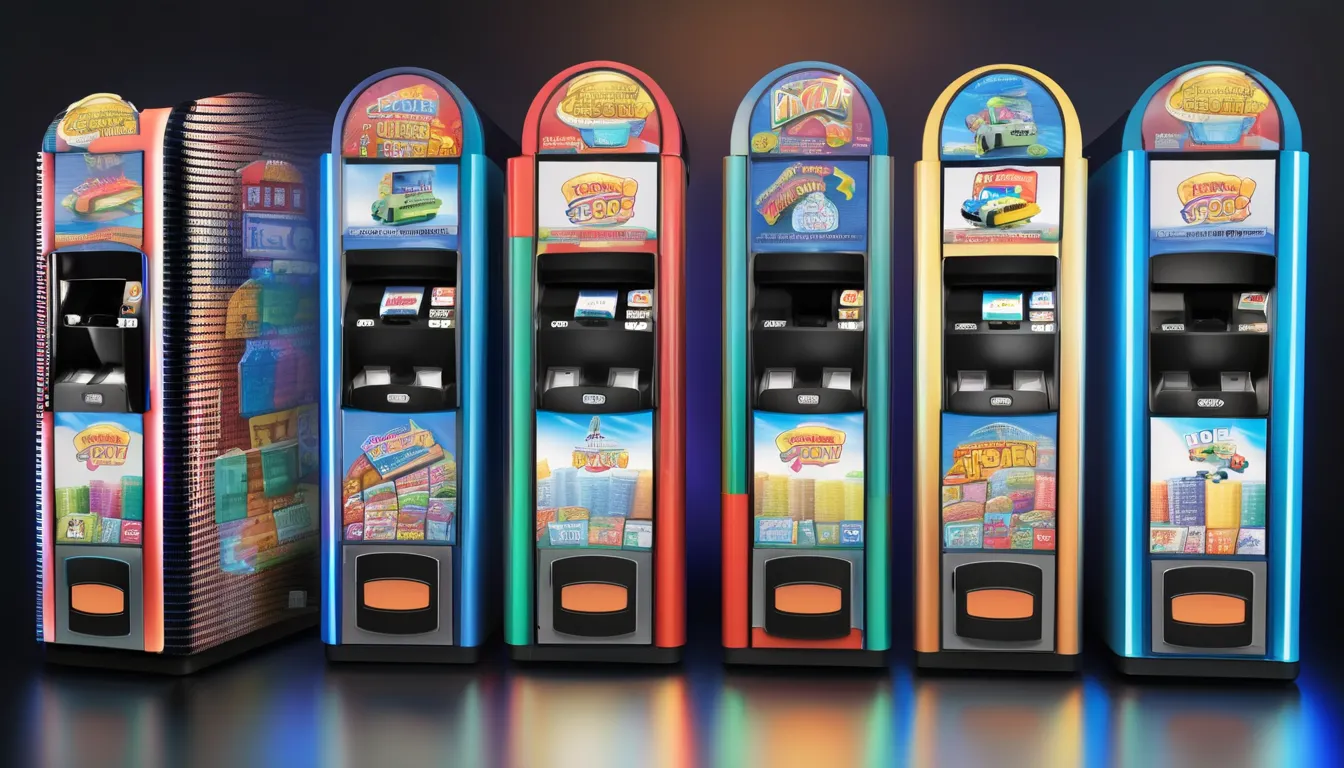When it comes to tax season, every business owner is on the lookout for legitimate ways to reduce their tax burden. Imagine a scenario where your business not only provides entertainment to customers but also serves as a tax-saving asset. Trading card vending machines might just be the answer you've been looking for. By understanding the tax benefits associated with these machines, you could potentially unlock a strategy that not only benefits your bottom line but also adds a unique layer of financial efficiency to your operations.
Benefits of Trading Card Vending Machines
When it comes to the benefits of trading card vending machines, convenience is key. These vending machines offer a hassle-free way to purchase trading cards without the need to visit a physical store or rely on online orders.
Imagine being able to quickly and easily access a variety of trading cards at any time of the day, whether you're at a mall, a gaming convention, or even a local store. With trading card vending machines, you have the convenience of instant gratification, eliminating the wait time for shipping or the need to search through shelves for specific cards.
Additionally, trading card vending machines often provide a secure and reliable way to obtain cards, ensuring authenticity and quality.
You can trust that the cards you purchase from these machines are genuine and in good condition, giving you peace of mind when expanding your collection. The ease of access and assurance of authenticity make trading card vending machines a valuable resource for both collectors and enthusiasts alike.
Tax Deductions for Card Purchases
Convenience and authenticity aren't the only perks of utilizing trading card vending machines. When it comes to tax deductions for card purchases, there are several benefits to keep in mind:
- Business Expenses: If you're using trading cards as part of your business or marketing strategy, the costs incurred from purchasing them can often be deducted as a business expense.
- Charitable Contributions: Donating trading cards to qualified charitable organizations can sometimes qualify for a tax deduction, especially if the cards have appreciated in value.
- Educational Purposes: If you use trading cards for educational purposes, such as teaching history or sports statistics, you may be able to deduct the cost of the cards as educational expenses.
- Investment Deductions: For serious collectors or investors, the costs associated with purchasing trading cards for investment purposes can sometimes be deductible as investment expenses.
Writing Off Maintenance Costs
To maximize your tax benefits when utilizing trading card vending machines, it's crucial to understand how you can write off maintenance costs associated with these machines.
Maintenance costs incurred for trading card vending machines are considered ordinary and necessary business expenses. These expenses can include repairs, servicing, cleaning, and any other upkeep required to keep the machines operational.
By keeping detailed records of all maintenance expenses, you can deduct these costs from your taxable income, reducing your overall tax liability. It's important to note that only expenses directly related to maintaining the vending machines are eligible for write-offs. Any personal expenses or unrelated costs can't be included.
Make sure to keep receipts, invoices, and documentation of all maintenance work done on the machines to substantiate your deductions in case of an audit. By properly documenting and writing off maintenance costs, you can effectively lower your taxable income and maximize your tax savings when operating trading card vending machines.
Maximizing Depreciation for Machines
Looking to optimize your tax benefits further when it comes to trading card vending machines? Maximizing depreciation for your machines can help you save more on taxes. Here's how you can make the most of this strategy:
- Accelerated Depreciation: Take advantage of accelerated depreciation methods like MACRS to depreciate your vending machines faster and reduce taxable income.
- Section 179 Deduction: Consider utilizing Section 179 deduction, which allows you to deduct the full purchase price of the vending machines in the year they were placed in service, up to a certain limit.
- Bonus Depreciation: Explore bonus depreciation, which permits you to deduct a significant percentage of the vending machine's cost in the first year of use.
- Regular Depreciation: If you choose not to use accelerated methods, the standard straight-line depreciation method can still offer tax benefits by spreading the cost of the machines over their useful life.
Record-Keeping for Tax Purposes
Optimizing your tax benefits for trading card vending machines involves meticulous record-keeping for tax purposes. Keeping detailed records of all expenses related to your vending machines is crucial for accurately reporting your income and deductions. Make sure to retain receipts for the purchase of the machines, any repairs or maintenance costs, as well as expenses for stocking the machines with trading cards.
Additionally, keep track of any expenses related to promoting your vending machine business, such as advertising costs or fees for attending trade shows.
Maintaining accurate records won't only ensure compliance with tax regulations but also help you maximize your tax deductions. By organizing your financial documents and records systematically, you can easily substantiate your expenses in case of an audit. Consider using accounting software or apps to streamline the record-keeping process and stay organized throughout the year.
Frequently Asked Questions
Can I Claim Tax Deductions for the Cost of Stocking Trading Cards?
Yes, you can claim tax deductions for the cost of stocking trading cards if they are used for a legitimate business purpose. Keep detailed records and consult with a tax professional to ensure compliance.
Are There Any Specific Tax Benefits for Using Vending Machines?
Yes, there are specific tax benefits for using vending machines. By tracking expenses and revenue accurately, you can potentially deduct costs related to maintenance, restocking, and even depreciation. Consulting a tax professional is advisable for tailored advice.
Can I Write off the Costs of Acquiring Rare or Limited Edition Cards?
Yes, you can potentially write off the costs of acquiring rare or limited edition cards as long as they are used for a legitimate business purpose. Consult with a tax professional to ensure proper documentation and compliance.
How Do I Calculate Depreciation for Trading Card Vending Machines?
To calculate depreciation for trading card vending machines, determine the initial cost, estimated useful life, and salvage value. Subtract the salvage value from the initial cost, then divide by the useful life to find the annual depreciation expense.
What Records Do I Need to Keep for Tax Purposes When Using Vending Machines?
To maximize IOT自販機 write-offs when using vending machines, keep detailed records of machine purchases, maintenance costs, sales revenue, and depreciation expenses. Ensure all transactions are accurately documented to support your tax deductions.
Conclusion
In conclusion, utilizing trading card vending machines can offer significant tax advantages for your business. By taking advantage of deductions for card purchases, maintenance costs, and depreciation, you can maximize tax write-offs and minimize taxable income. Make sure to keep detailed records of all machine-related expenses to optimize your tax savings. Consider investing in these machines as a strategic way to enhance your business operations while also benefiting from valuable tax benefits.




